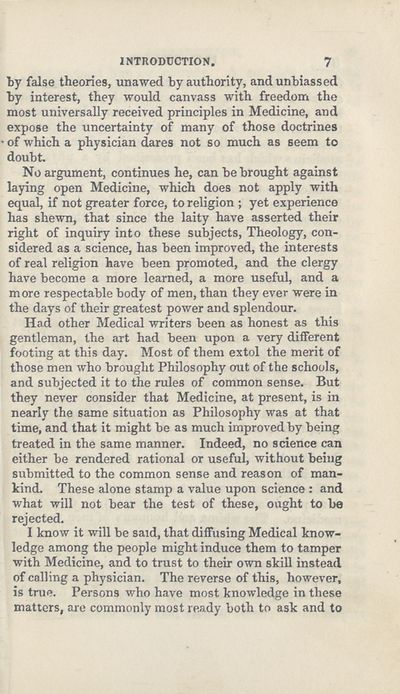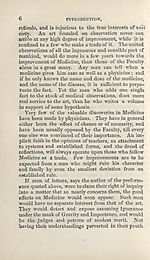Diseases > Domestic medicine
(21)
Download files
Complete book:
Individual page:
Thumbnail gallery: Grid view | List view

1 INTRODUCTION. 7
by false theories, unawed by authority, and unbiassed
by interest, they would canvass with freedom the
most universally received principles in Medicine, and
expose the uncertainty of many of those doctrines
• of which a physician dares not so much as seem to
No argument, continues he, can be brought against
laying open Medicine, which does not apply with
equal, if not greater force, to religion ; yet experience
has shewn, that since the laity have asserted their
right of inquiry into these subjects, Theology, con¬
sidered as a science, has been improved, the interests
of real religion have been promoted, and the clergy
have become a more learned, a more useful, and a
more respectable body of men, than they ever were in
the days of their greatest power and splendour.
Had other Medical writers been as honest as this
gentleman, the art had been upon a very different
footing at this day. Most of them extol the merit of
those men who brought Philosophy out of the schools,
and subjected it to the rules of common sense. But
they never consider that Medicine, at present, is in
nearly the same situation as Philosophy was at that
time, and that it might be as much improved by being
treated in the same manner. Indeed, no science can
either be rendered rational or useful, without being
submitted to the common sense and reason of man¬
kind. These alone stamp a value upon science : and
what will not bear the test of these, ought to be
rejected.
I know it will be said, that diffusing Medical know¬
ledge among the people might induce them to tamper
with Medicine, and to trust to their own skill instead
of calling a physician. The reverse of this, however,
is true. Persons who have most knowledge in these
matters, are commonly most ready both to ask and to
by false theories, unawed by authority, and unbiassed
by interest, they would canvass with freedom the
most universally received principles in Medicine, and
expose the uncertainty of many of those doctrines
• of which a physician dares not so much as seem to
No argument, continues he, can be brought against
laying open Medicine, which does not apply with
equal, if not greater force, to religion ; yet experience
has shewn, that since the laity have asserted their
right of inquiry into these subjects, Theology, con¬
sidered as a science, has been improved, the interests
of real religion have been promoted, and the clergy
have become a more learned, a more useful, and a
more respectable body of men, than they ever were in
the days of their greatest power and splendour.
Had other Medical writers been as honest as this
gentleman, the art had been upon a very different
footing at this day. Most of them extol the merit of
those men who brought Philosophy out of the schools,
and subjected it to the rules of common sense. But
they never consider that Medicine, at present, is in
nearly the same situation as Philosophy was at that
time, and that it might be as much improved by being
treated in the same manner. Indeed, no science can
either be rendered rational or useful, without being
submitted to the common sense and reason of man¬
kind. These alone stamp a value upon science : and
what will not bear the test of these, ought to be
rejected.
I know it will be said, that diffusing Medical know¬
ledge among the people might induce them to tamper
with Medicine, and to trust to their own skill instead
of calling a physician. The reverse of this, however,
is true. Persons who have most knowledge in these
matters, are commonly most ready both to ask and to
Set display mode to:
![]() Universal Viewer |
Universal Viewer | ![]() Mirador |
Large image | Transcription
Mirador |
Large image | Transcription
| Antiquarian books of Scotland > Diseases > Domestic medicine > (21) |
|---|
| Permanent URL | https://digital.nls.uk/119888394 |
|---|
| Description | Thousands of printed books from the Antiquarian Books of Scotland collection which dates from 1641 to the 1980s. The collection consists of 14,800 books which were published in Scotland or have a Scottish connection, e.g. through the author, printer or owner. Subjects covered include sport, education, diseases, adventure, occupations, Jacobites, politics and religion. Among the 29 languages represented are English, Gaelic, Italian, French, Russian and Swedish. |
|---|

